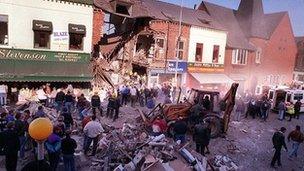A reminder why we must never go back
- Published
- comments

The Shankill bomb provoked fears that Northern Ireland could return to the carnage of the 1970s
Two quite different anniversaries this week evoked contrasting memories.
Twenty years ago when the IRA bombed Frizzell's fish shop on the Shankill Road I was a reporter on the BBC's Spotlight programme.
Back in 1993, I don't think any of us on the team had even worked out Spotlight was 20 years old.
Caught up in one of the most traumatic periods of the Troubles, we were running to stand still, trying to explain the dreadful events happening around us.
I remember working on a film called Turning Back The Clock with Jane Dodge reporting and me acting as a temporary producer.
During that awful period around the Shankill bomb and the Greysteel shootings, there was a widespread fear that Northern Ireland might be about to plunge back into the level of carnage witnessed in the early 1970s.
I recall us interviewing the mother of one of the victims of the Bayardo bar bombing describing her emotions when she first heard about the 1993 atrocity.
The fear was understandable. But with the benefit of hindsight the terrible times in 1993 appear to have been the darkness before the dawn of the 1994 ceasefires.
Grief and pain
Twenty years on, the grief and pain have not diminished - as Tuesday night's moving commemoration on the Shankill Road illustrated.
Nor is any resolution in sight to the many dilemmas about dealing with the past - as the fierce controversy over the unveiling of a plaque to the IRA bomber Thomas Begley or the stand-off over the Maze Peace Centre prove.
Most will agree we are in a better place than 20 years ago. However, the continuing security alerts show some groups don't care if they punch a hole in the fragile stability.
The Shankill bomb anniversary was raised in the Commons on Wednesday by the DUP MP William McCrea, who asked David Cameron whether he agreed no-one should equate innocent victims and guilty murderers.
The prime minister brought together the past and the future, responding that no-one should glorify terrorism or those involved in it, but adding that everyone should come together to help build a shared future.
One can only express solidarity with those still living with the legacy of such tragic loss.
But on a brighter note it's heartening that the latest statistics show that, in 2013, despite all the economic and political challenges we face, many of us appear happy with our lot, external.
The challenge for all our politicians is to do their best to keep it that way, by ensuring the clock is never turned back.